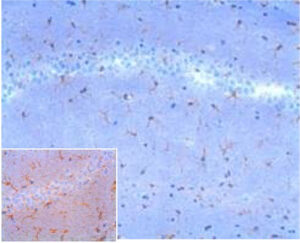MODEL LINEUP
Icv-STZ model
icv-STZ Model
The icv-STZ model is a streptozotocin induced model used for sporadic Alzheimer’s disease with insulin resistance in the brain, in which STZ (streptozotocin: a chemical that causes diabetes) is administered into the ventricle of the brain. Our icv-STZ model is widely used as an Alzheimer’s disease model demonstrating memory impairment, choline deficiency, glucose metabolism disorder, oxidative stress, inflammation and neurodegeneration.
We are able to use our extensive experience and expertise as a non-clinical CRO to propose optimal study designs according to the target mechanism (inflammation, oxidative stress, glucose metabolism, etc.). By using this model in addition to conventional research, clients are able to gain new insights in regards to the understanding of the pathological mechanism of the disease and in assessing the medicine’s efficacy.

Figure 1. GFAP staining of the hippocampal CA1 region.
